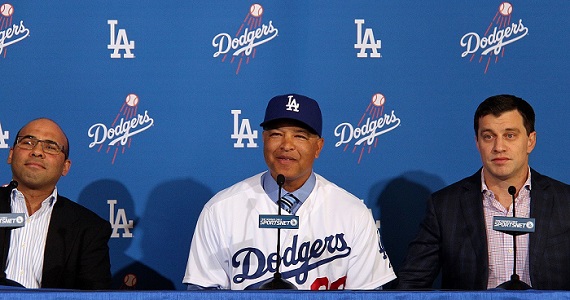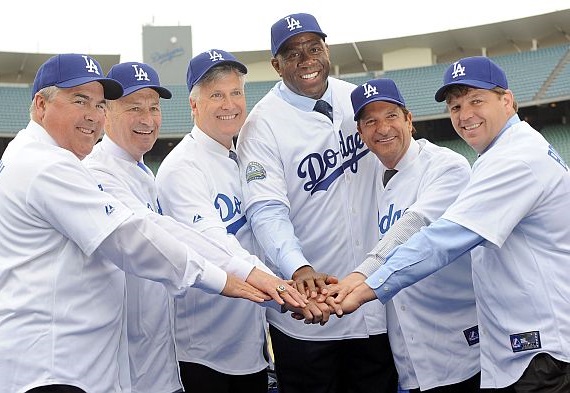Andrew Friedman and Farhan Zaidi were brought on board in the fall of 2014 to help right the ship in Los Angeles. The Dodgers ship, that is, as the Angels are on their own. The now 39-year-old Friedman became the President of Baseball Operations with the Dodgers. He had previously served a nine year tenure as the General Manager of the Tampa Bay Rays. The 38-year-old Canadian born Zaidi was fresh off his 2014 posting as Director of Baseball Operations and Assistant General Manager of the Oakland Athletics.
During the recent 2015 Winter Meetings the Dodgers failed to sign any of the big free agents available including much sought after starting pitchers. On various blogs and in the social media, Dodger fans are showing more than a little impatience with the front office, even suggesting that heads may roll if the Dodgers do not at least make the playoffs in 2016. I am not one of those who feel that Friedman and Zaidi are on a stopwatch and must walk on water during the upcoming season. I believe they are in it for the long haul.

Although Farhan Zaidi, Dave Roberts and Andrew Friedman definitely have their work cut out for them, don’t be surprised to find the Dodgers 40-man roster on Opening Day 2016 to be significantly different than it is today.
(Photo credit – Ron Cervenka)
Although we cannot be sure what their mandate letter from Dodger President Stan Kasten might have been when Friedman and Zaidi arrived at Dodger Stadium, we can speculate as to its particulars. Speculation might not yield many fruits with these two baseball gurus, but here goes.
First, I expect they were commissioned with the task of bringing a World Series Championship to Dodger Stadium. I doubt that the time frame was to be instantly. However, it appears they did make a serious run at a championship in their first year as a team in the front office. They made a number of roster moves bringing in at least 14 players from other organizations, mostly through trades. Among them – Brandon McCarthy, Brett Anderson, Alex Wood, Jimmy Rollins, Joel Peralta, Chris Hatcher and Howie Kendrick – were seen as key pieces to the puzzle. Only McCarthy, with a four year contract, was given a longer term contract than one year.
The Dodgers fell short of a World Series appearance once again exiting in the first round of the playoffs by losing 3-2 to the upstart New York Mets in the fifth and deciding game of the NLDS.
The team perhaps never recovered from the loss of starting pitchers Hyun-jin Ryu and Brandon McCarthy, both of whom were lost to the team with season-ending injuries. Additionally, the injury to catcher Yasmani Grandal, which was more serious than most suspected, was an offensive blow to the team.
There may well have been other reasons for the loss but it is sufficient to say number one on the mandate letter is still on the front burner.
Secondly, there can be little doubt that President Kasten mandated the new brain trust with building a farm system that not only would become one of the strongest, if not the strongest, in MLB and one that will allow the Dodgers to compete at a playoff level year after year. Build so when a player goes down to injury there is one waiting to take his place. Build so the farm system is the key to all things good. That is, development of major league players to dot the Dodgers line up and with blue chip prospects still available to trade for roster parts not readily available on the farm.
Through trades, the annual First Year Player Draft and international signings, the Dodgers have already moved near or into a top five ranking on most lists. Considerable credit for the strength building in the farm system must go to former Dodgers Vice President of Amateur Scouting Logan White and his scouting team. White now plies his trade with the San Diego Padres.
Although the 2015 June Draft appeared to be a good one for the Dodgers, the initial enthusiasm was tempered somewhat when it was revealed that first round selection Vanderbilt right-hander Walker Buehler would end his season with Tommy John surgery before it started. In addition to that, the Dodgers were unable to sign another strong right-hander, Kyle Funkhouser out of Louisville University, who they selected with the 35th overall pick.
The Dodgers surged into the international market with almost reckless abandonment. The advantage on the international market is that they did not have to wait in line for a pre-ranked selection. They could simply outbid other teams, which they did. Among others, they signed Yadier Alvarez, a 19-year-old Cuban right-hander who was the second ranked player on Major League Baseball’s Top 30 international prospects list.
One of Andrew Friedman’s strengths with Tampa Bay was to make trades involving more than one other trading team and using high draft selections acquired from other teams to swing the deals he actually wanted.
Friedman prefers to acquire prospects at or close to MLB ready. In his first season as the Dodgers front man he acquired the very versatile Kiké Hernandez, catcher Austin Barnes and 21-year-old second baseman Jose Peraza. He also acquired right-hander Andrew Heaney, a ninth overall selection in 2012 by the Miami Marlins, and within hours traded him to the Angels for second baseman Howie Kendrick.
Yesterday we learned that the very same Joel Pereza, along with outfielder Scott Schebler and infielder Brandon Dixon, were involved in a three-way trade that netted right-handed pitcher Frankie Montas, outfielder Trayce Thompson and second baseman Micah Johnson from the Chicago White Sox. The betting is that all three will not remain in the Dodgers farm system but become part of yet another trade, perhaps for a young starting pitcher.
As already mentioned, the Dodgers did not make a splash at the Winter Meetings. The reason for inaction was not because they didn’t have a boatload of money – or was money actually the issue?
Getting back to the mandate letter for Friedman and Zaidi, I’m willing to bet they were directed to bring the Dodgers payroll under control with sustained fiscal responsibility. For me the greatest impediment to building the Dodgers in the short term is the highest payroll in MLB. Regardless of how much money they have, the Guggenheim Group is running a business and owners want good returns on their money. That is, a World Series ring or at least a financial profit. In 2015 the Dodgers payroll was the highest in MLB history flirting with the $300 million high water mark. There can be little doubt that the Dodgers ownership expected more for their money and rightfully so.

Dodgers owners Bobby Patton, Stan Kasten, Mark Walter, Magic Johnson, Peter Guber and Todd Boehly.
(Photo credit – Andy Holzman)
Andrew Friedman and Farhan Zaidi came on board with the Dodgers with a huge millstone around their necks. In short, the Dodgers payroll was strangling them. They inherited a series of contracts that were both large in terms of payroll and long in terms of years. They were attached to players who could no longer perform at the level expected by those contracts and were therefore immovable in a trade unless the Dodgers ate their large contracts.
How bad was it? In 2015 the Dodgers paid $34.5 million to players to play on other teams. They paid a combined $17 million to release relievers Brian Wilson and Brandon League. In addition to that they will pay a luxury tax of $43.7 million on January 21. All told they paid $94.2 million because… well, just because they paid it. To say the least that is a bit embarrassing and drew criticism from practically everyone – especially division rivals. By comparison the New York Mets, who eliminated the Dodgers in the first round of the playoffs, had a payroll of $101 million in 2015, and the Kansas City Royals won the World Series with a payroll of $113 million – a little more than one-third of the Dodgers salary commitments.
The easy lesson is that just as money can’t buy us love, it most certainly cannot buy World Series Championships – as has been demonstrated by the Dodgers over the past 27 years. Friedman and Zaidi have shed considerable payroll and are working to build the team to be competitive in the short run and dominant in the long term. Gone are the days of long costly contracts to players on the downhill side of their careers. Any future long contracts will be to lock up young players on the way up, as Friedman did in Tampa Bay with third baseman Evan Longoria.
Total financial emancipation for the Dodgers is still two to three years away. Following the 2018 season the Dodgers will have divested themselves of all their long term contracts, except that of Clayton Kershaw. At that time one of two things will have happened. Either Kershaw will opt out of his contract after the 2018 season or the Dodgers will have extended his contract prior to the completion of the season.
Meanwhile, Friedman and Zaidi are working with a financial albatross still around their necks. They are working as if they are directing a small market team restricted not by insufficient funds but perhaps by the most unruly payroll in baseball history. They are collecting young players, making trades using young players from other teams and bringing down a previously uncontrolled payroll. They are building a team, which takes time, not concentrating on buying a collection of individuals. They are not making a big splash with unmanageable contracts but making ripples that when put together will create a big wave. They are playing the long game which requires some patience both from the fans and team owners.
I have a feeling the wait might not be all that long.




 December 17th, 2015 at 7:00 am
December 17th, 2015 at 7:00 am  by Harold Uhlman
by Harold Uhlman  Posted in
Posted in 

getting payroll under control helps them compete. I’m impressed at the team they put together last year. Excited for 2016
Me too for 2016. I really like that they use other teams minor league rosters in trades as if they were Dodger farm teams. Friedman sees the minor leagues as one big smorgasbord from which to choose.
That was one of the most interesting articles I’ve read. Although it was just telling the story, I truly liked it a lot. Nice going Ron.
Harold wrote it.
oop! Sorry Ron, I guess I goofed again. Nice article Harold.